Feast on the fertile teachings of farming in the Bible, where agriculture is not just a profession, but a profound spiritual metaphor.
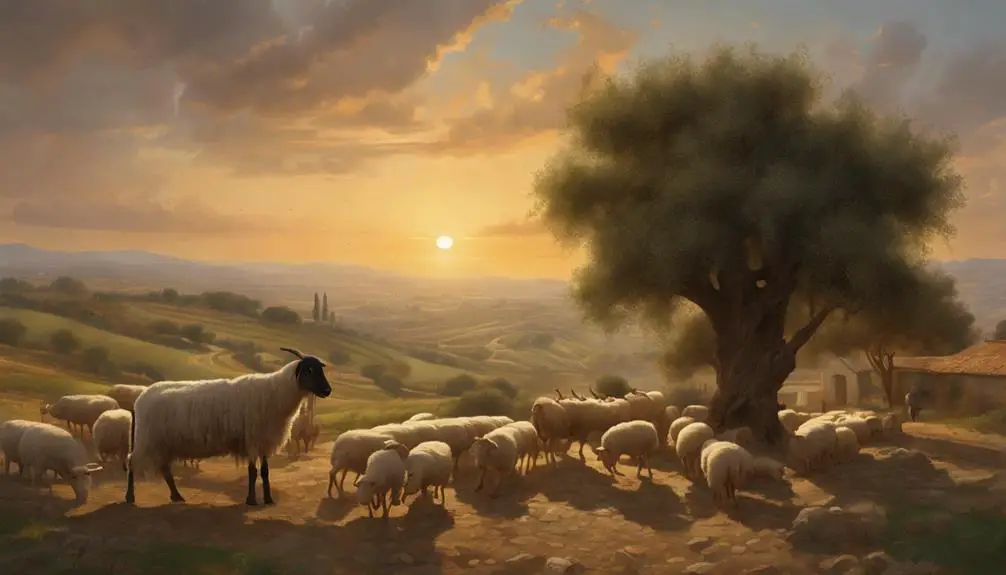
Farming in the Bible
Imagine the Bible as a fertile field, ripe with lessons and stories about farming. You'll find that agriculture isn't just a backdrop but a central theme, shaping the lives of biblical characters and illustrating profound spiritual truths.
From the vineyards of Noah to the seven fat and thin cows in Pharaoh's dream, farming techniques, crops, and livestock provide powerful metaphors for life, faith, and morality.
Curious to uncover these agrarian teachings further? There's a wealth of wisdom waiting for you just beneath the surface.
Key Takeaways
- The Bible uses sophisticated agricultural practices to illustrate spiritual truths and teachings.
- Significant crops in the Bible like barley, wheat, and olive trees symbolize God's providence and blessings.
- Biblical farmers like Abel and Noah exemplify lessons on dedication, diversification, and divine communication.
- Spiritual symbolism of farming in the Bible connects cultivation of land with faith, love, good deeds, and spiritual growth.
Agricultural Practices in Biblical Times
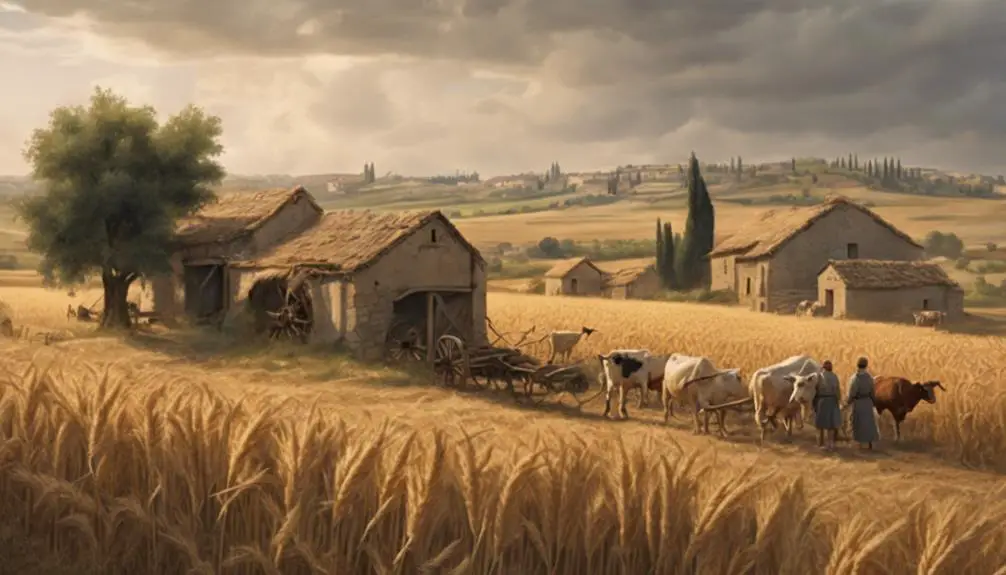
While you may imagine the ancient agrarian lifestyle as simple and rudimentary, the agricultural practices in biblical times were surprisingly sophisticated, deeply intertwined with their theological beliefs and essential for their survival. Biblical irrigation techniques, for instance, were far from primitive. You'd find that they devised and utilised systems akin to the modern drip irrigation, using channels and ditches to direct water from rivers and reservoirs to their fields. This water management not only reflected their technical prowess but also their reverence for water as a divine blessing.
Ancient livestock management was another impressive aspect. Rather than merely herding animals, they understood the importance of selective breeding, nutrition, and disease control. Their livestock wasn't just for meat, but for milk, hides, and manure too. This holistic approach demonstrated their insight into the interconnectedness of life, a reflection of their theological understanding.
Analyzing these practices, you can't help but see the wisdom of the ancients. Their farming techniques weren't just about survival, but a testament to their belief in the sanctity of the land and life, a divine mandate for stewardship, and an enduring legacy we still benefit from today.
Significant Crops in the Bible
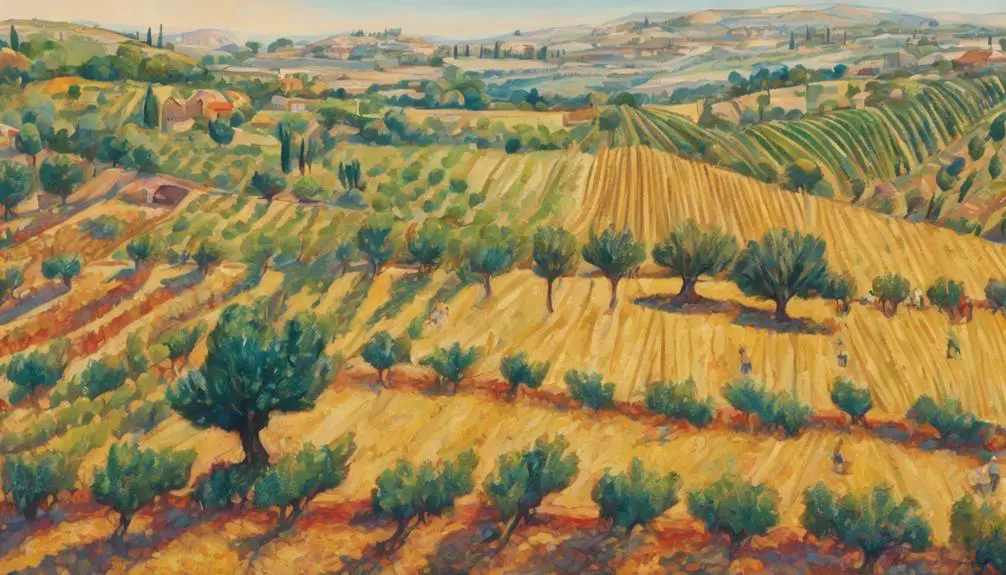
In the same way that their farming techniques reflected their deep theological beliefs, the crops they chose to cultivate also held significant spiritual and practical importance in biblical times. You can observe this in the grains, fruits, and vegetables that constituted the biblical diet.
Biblical farmers cultivated barley and wheat extensively. These grains were staple foods and symbolic of God's providence. They were central to the Crop Trade Routes, serving as a primary commodity exchanged amongst nations. Olive trees were also significant, their oil representing God's anointing and blessings.
Vineyards, too, held a dual role. They provided grapes for sustenance and wine, integral to religious rituals. Figs and pomegranates, rich in symbolism, were commonly grown. The former symbolized peace and prosperity, while the latter embodied fruitfulness and righteousness.
Lentils, cucumbers, leeks, onions, and garlic were part of the biblical diet as well. Their cultivation demonstrated the Israelites' reliance on God for their daily needs.
In analyzing these crops, it's clear that for the Israelites, farming wasn't just a means of survival. It was a spiritual discipline, a tangible expression of their faith and dependence on God. Their choice of crops reflected this, offering a fascinating insight into their theological and agricultural practices.
Farming Parables and Teachings
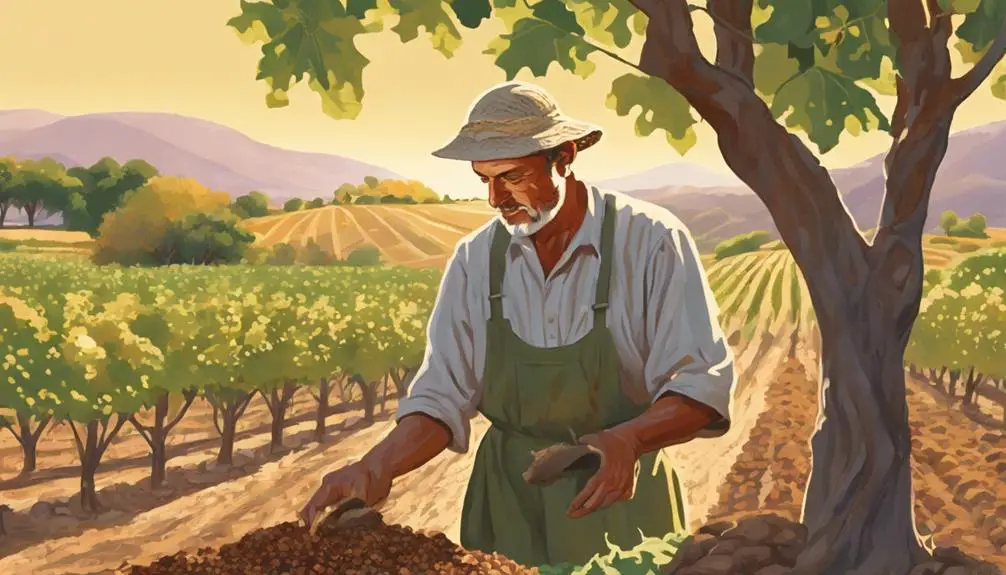
Numerous parables and teachings in the Bible employ farming metaphors, showcasing the profound link between agriculture and faith. You'll find that these agricultural parables often serve as teaching methodologies, effectively conveying spiritual truths through the familiar lens of farming life.
Take the Parable of the Sower, for instance. Here, the act of sowing seeds is likened to spreading the Word of God. The various types of ground where the seeds fall represent different reactions to God's Word. This parable interpretation illuminates how the condition of one's heart can affect receptivity to divine truth.
In another parable, the Wheat and the Tares, Jesus speaks of a farmer's field overrun with weeds. This story symbolizes the world, where good and evil coexist until the final judgment.
The Parable of the Mustard Seed, yet another farming analogy, speaks to faith's potential to grow from small beginnings into something extraordinary.
Notable Biblical Farmers
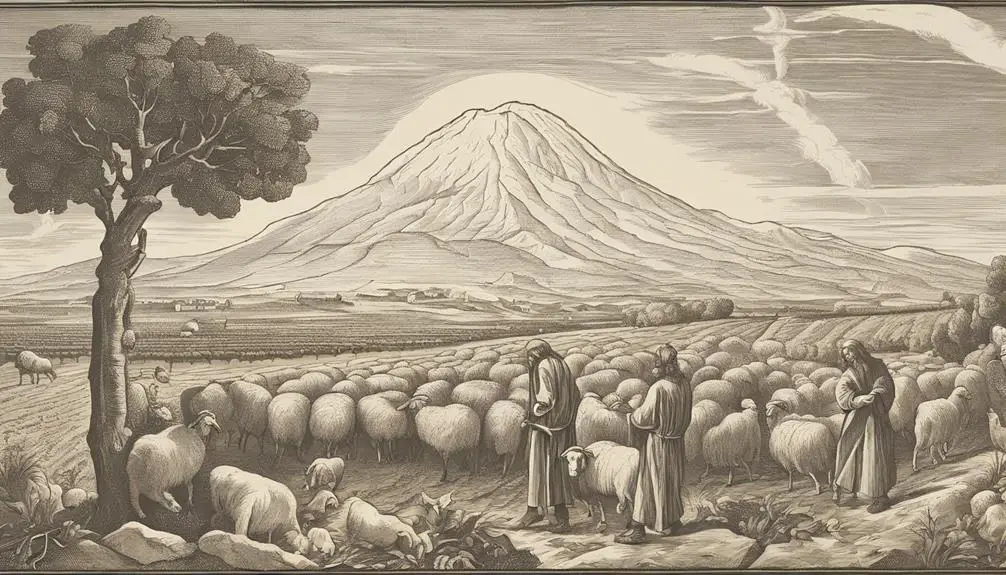
Ever wondered who the prominent farmers in the Bible are and what lessons they impart through their agricultural endeavors? Let's delve into this fascinating topic.
Abel, the son of Adam and Eve, was the first recorded farmer in the Bible, raising livestock with diligence and care. His offerings of his best flock to God exemplify the spirit of giving the best of your labor to the Lord.
Then there's Noah, post-flood vintner, who teaches us about the diversification of farming. His vineyard cultivation underscores the value of expanding agricultural pursuits.
The 'Farmer Prophets' impact is undeniably profound. They often used farming as a metaphor to communicate divine messages. For instance, the Prophet Amos, initially a shepherd and a tender of fig trees, used agricultural imagery in his prophecies. His life and teachings demonstrate that God can use anyone, regardless of their profession, to deliver His messages.
Agricultural tools usage is also evident in the Bible. Consider the plow, used by Elisha, who was called to prophethood while plowing his field. This signifies that the sacred and the mundane, spiritual calling and daily work, can coexist harmoniously.
These biblical farmers' lives offer valuable lessons on dedication, diversification, and divine communication.
Spiritual Symbolism of Farming
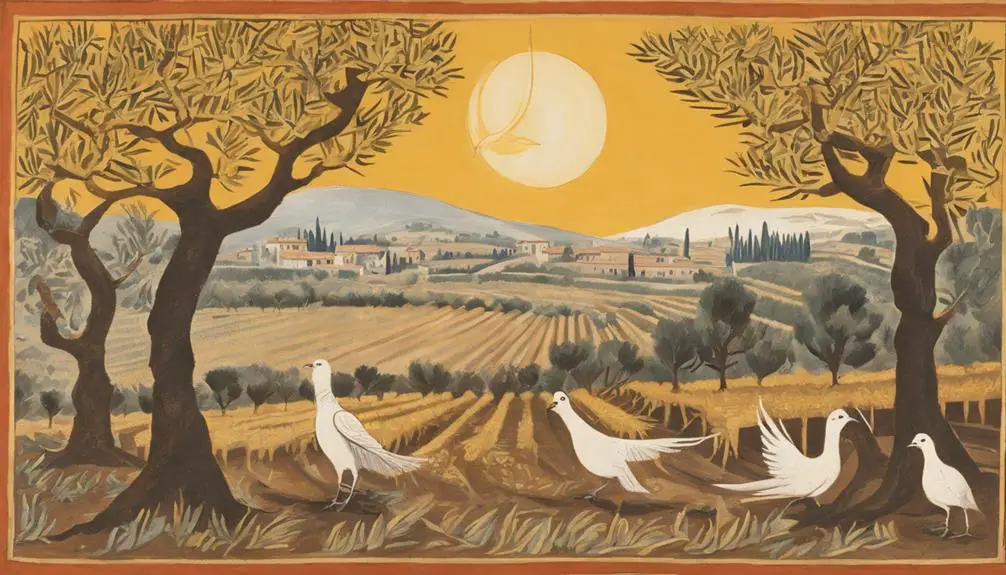
Building upon the lives of these noteworthy biblical farmers, let's explore the spiritual symbolism embedded in farming practices. In the Bible, seed sowing isn't merely an agricultural act; it's a spiritual metaphor, a symbol of faith and the divine act of creating life.
Seed Sowing Spirituality is about planting seeds of faith, love, and good deeds in our lives. As you sow, so you'll reap. This principle, rooted in Galatians 6:7, highlights the relationship between our actions and their consequences. The seeds we plant today determine the fruit we harvest tomorrow.
Biblical Harvest Rituals also carry profound spiritual implications. The Feast of Harvest, also known as Pentecost, commemorates the time when the Holy Spirit descended upon the followers of Christ, marking the birth of the Church. The harvest is representative of spiritual growth and the fruition of our faith journey.
Farming, in this light, becomes a divine endeavor, deeply intertwined with our spiritual lives. It's a testament to the biblical truth that spiritual growth, like a crop, requires time, patience, and nurturing. So, as you till the soil of your soul, remember that every seed sown in faith counts towards your spiritual harvest.
Frequently Asked Questions
What Kind of Farm Animals Were Mentioned in the Bible?
Diving into Biblical animal symbolism, you'll find numerous farm animals mentioned. Sheep, goats, cows, and donkeys are common. They're not just livestock in Scripture, they're sacred symbols too.
Sheep symbolize innocence and obedience, while goats often represent stubbornness. Cows, considered valuable assets, are symbols of wealth. Donkeys, known for their hard work, represent humility and service.
How Did Climate and Geography Affect Farming in Biblical Times?
You're exploring how climate and geography influenced agriculture in ancient times. Consider the biblical irrigation methods they'd have used in arid areas, and how ancient crop rotation strategies varied with topography.
The weather patterns and terrain would've greatly impacted what could be grown and when. Hence, they'd to adapt and innovate to survive, whether it was through artificially watering their crops or rotating them to maintain soil fertility.
How Were Farming Techniques Passed Down Through Generations During Biblical Times?
You'd find, during those times, farming techniques were orally transmitted from one generation to the next. Through storytelling and hands-on practice, they'd learn the art of 'Biblical Crop Rotation' and the importance of 'Sacred Farming Rituals.'
This enabled communities to preserve their agricultural knowledge, ensuring a sustainable food supply. Analyzing these methods gives us insight into how the ancients cleverly adapted to their environment, despite their limited technological resources.
What Role Did Women Play in Biblical Farming?
In biblical times, women's roles in agriculture were quite significant. They'd typically handle tasks like planting, weeding, and harvesting. Their contributions were vital for the community's survival.
But remember, it's not just about physical labor. Women also passed down knowledge and traditions, shaping the agricultural practices of their time. So, you see, gender roles in agriculture were clearly defined, with biblical women's contributions playing a key role.
Were There Any Specific Dietary Restrictions Related to Farming Products in the Bible?
Yes, there were specific dietary restrictions related to farm products in the Bible. During Biblical Harvest Festivals, certain foods weren't consumed due to religious law. Sacred Produce Offerings also influenced their diet.
These offerings often consisted of the first fruits or grains harvested, which were then not available for general consumption. These practices reflect the deep respect for divine providence and the interplay of religion and daily sustenance in biblical times.
Conclusion
So, you've journeyed through the rich tapestry of biblical farming. You've explored ancient agricultural practices, marveled at significant crops, and gleaned wisdom from farming parables.
You've met notable biblical farmers and pondered the spiritual symbolism of farming. Remember, just as soil needs tending, so does your spirit.
Keep sowing seeds of faith, nourishing them with love and patience, and you'll reap a bountiful harvest in your spiritual journey.


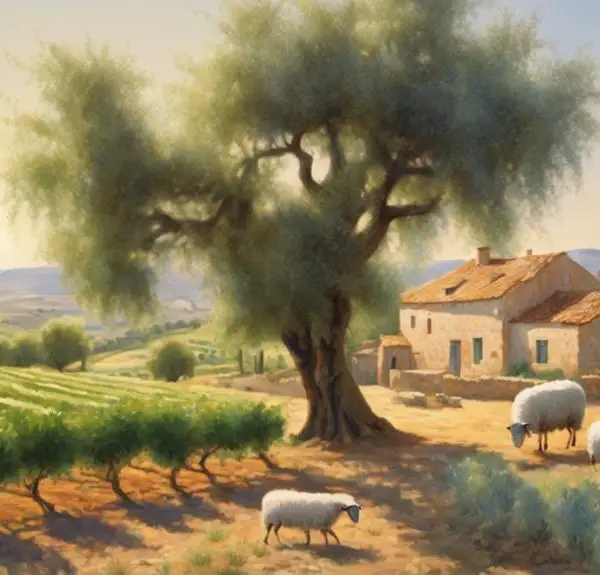
Sign up